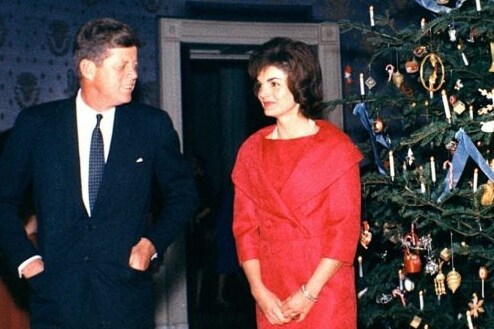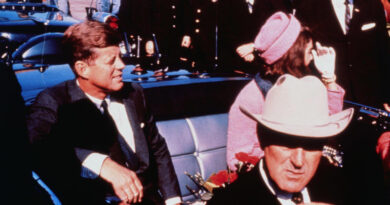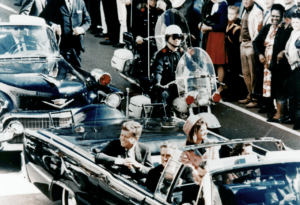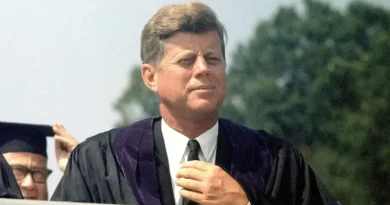Perspective | The tie between the Kennedy assassination and Trump’s conspiracy mongering

Such behavior was unimaginable for earlier presidents. And yet conspiracy theories have a long history in right-wing politics. But tempting though it may be to chalk conspiracies up as a conservative phenomenon, the truth is more complicated. In fact, it was the assassination of John F. Kennedy 57 years ago today that transformed such paranoid thinking into more widespread distrust of government, ultimately creating openings for a demagogue like Trump.
In 1964, the President’s Commission on the Assassination of President Kennedy, popularly known as the Warren Commission, concluded that Lee Harvey Oswald, acting alone, had fired three bullets from the sixth floor of the Texas School Book Depository building. It found that Oswald’s death 48 hours later at the hands of local nightclub owner Jack Ruby was an act of spontaneous revenge. Surprisingly, the report received a warm reception, and within two months after its release, 87 percent of respondents in a survey said they believed Oswald, acting alone, had shot the president.
And yet, by the early 1970s, a majority of the public began to question the Warren Commission’s central conclusion that a lone gunman was responsible for Kennedy’s death. Beginning with the 1966 publication of Mark Lane’s bestseller “Rush to Judgment,” an army of investigative journalists and self-styled assassination experts refused to accept that the assassination could have been the result of a random, inexplicable act of violence, that a loser like Oswald could have single-handedly killed a man as great as Kennedy. This began as a well-intentioned search for alternative explanations of the assassination, but it ended up fueling the emergence of a conspiracy culture that now permeates every aspect of American society.
The thread that runs through most Kennedy assassination conspiracy theories is that a shadowy network of nefarious individuals, working as part of a “deep state,” conspired to kill the president because he offered a new direction for the country. Originally, those who challenged the Warren Commission report focused on Cold War motivations, with either the Soviets or possibly the Cubans as perpetrators, which made sense, considering that Kennedy was assassinated just one year after the Cuban missile crisis.
As Cold War tensions decreased in the 1970s, however, critics looked closer to home for an explanation. The disaster in Vietnam, the Johnson administration’s duplicity in explaining it, and Watergate combined to erode public faith in the integrity of government leaders. The journalist Tom Wicker wrote that many Americans had come to view their government as “a fountain of lies.” The pollster Daniel Yankelovich noted in 1977 that trust in government had declined from 80 percent in the late 1950s to about 33 percent in 1976.
In this environment, critics chipped away at the Warren Commission’s conclusions, citing magic bullets and suspicious figures on a grassy knoll to hint at a larger plot to assassinate Kennedy. In December 1978, these critics seemed to receive official support from the House Select Committee on Assassinations (HSCA) which concluded, on the basis of a flawed acoustical analysis of a police motorcycle dictabelt recording, that four shots were fired at the president’s motorcade. The report only added to public doubt over the Warren Commission’s conclusions, and the new culture of cynicism helped conspiracy theories grow.
By the 1980s, polls showed that many Americans believed their own government — not foreign actors — was involved in the assassination.
In 1991, the filmmaker Oliver Stone added his own paranoid twist to the controversy with his wildly popular movie “JFK.” The film suggested that the military-industrial complex killed Kennedy because he planned to pull out of Vietnam. But Stone took his argument one step further, asserting in The Washington Post shortly after the release of “JFK” that the assassination “put an abrupt end to a period of innocence and great idealism.”
Such a theory fed into simplified and exaggerated myths about Kennedy’s presidency and the past more broadly. Many Kennedy supporters trumpeted this revisionist narrative that his death erased possibility and sent the country careening downward. They went to great lengths to show that, throughout the 1960s and 1970s, rioting in the streets, campus unrest and, most of all, the escalation in Vietnam, resulted from the personal and policy failures of Lyndon Johnson and Richard Nixon, not from the flawed assumptions of postwar liberalism itself. Had Kennedy lived, supporters claimed, we would not have had Vietnam or Watergate.
Liberal Kennedy champions looking to deny the failings of liberalism and conspiracy theorists trying to debunk the Warren Commission findings made for strange bedfellows. But they were united by this narrative of Kennedy’s life and death, which provided a simple explanation for the turbulence that marred the late 1960s and the 1970s. The bullets that struck down Kennedy marked a key turning point in American history, they asserted, snuffing out the country’s golden years, a time when the United States stood strong in the world, our nation felt united and life seemed simpler.
This idea has persisted to the present, embedded in Trump’s shameless promise to “Make America Great Again.”
It is perhaps one of the greatest illustrations of the irony of history: Kennedy’s image is being co-opted to buttress backward ideas and weaken political institutions. After all, Kennedy won the presidency in 1960 by advocating change, a “New Frontier.” At least on a rhetorical level, he challenged Americans to confront outdated beliefs and practices.
Yet, conspiracy advocates have peddled myths distorting Kennedy’s life and death for far too long, thereby fueling cynicism about American institutions that has opened the door for Trump to lie with impunity. If the “deep state” could assassinate a president, then surely it would be capable of stealing an election.
The ground for such conspiracy mongering is even more fertile today. If anything, distrust in government has only grown with time — a 2020 Pew Research study found a mere 20 percent of Americans trust Washington to “do the right thing” just about always or most of the time. And the rise of the Internet, and conservative talk radio and cable television news, has given megaphones to personalities who preach a rabidly anti-government message — and show little regard for facts.
It is tempting to see Trump solely as a byproduct of this right-wing world. But it is more useful as we mark the passing of Kennedy this year — with Trump clinging fruitlessly to office, awash in falsehoods and conspiracies — to consider the ties between the two. Kennedy was a bold and imaginative, albeit flawed, leader who saw the potential for government to be a force for good in the world and to right wrongs. That his death would foster a conspiracy culture that contributed to Trump’s rise exposes the decay of our political discourse and the decline of our public institutions.
This article has been archived for your research. The original version from The Washington Post can be found here.


